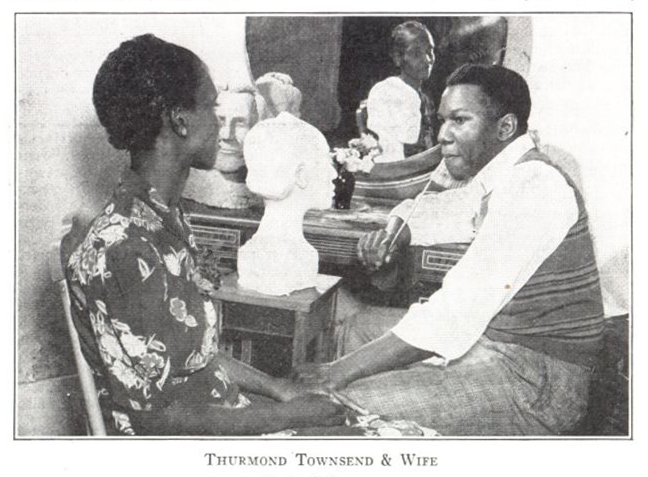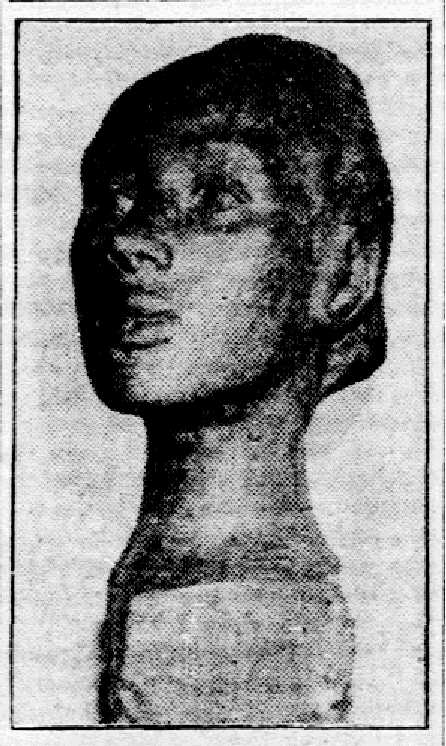In early 1938, 26-year-old Thurmond Townsend was appraising his backyard and became intrigued by the now malleable mud, which had the consistency of clay. Though he had never tried modeling before, Townsend started working with the mud to create busts of George Washington and Abraham Lincoln from pictures. The two sculptures were going well… except for the ears. On his way home from work as a bus boy, Townsend stopped into the Dallas Art Institute and asked instructor Harry Lee Gibson how to sculpt ears.
Taking Gibson’s advice that he try modeling from life, Townsend created a bust of his wife Marie. He entered this sculpture in the 9th Annual Dallas Allied Arts Exhibition (March 20-April 17, 1938). The Dallas Art Association, now DMA, started holding juried exhibitions for artists residing in Dallas and Dallas County in 1928 and did so annually through 1964.
Townsend’s mud Marie Townsend was not only accepted to the exhibition’s Sculpture and Crafts section, but was awarded a $25 prize sponsored by Karl Hoblitzelle, a DMFA Board member. Townsend’s sculpture was the first work by a Black artist accepted to the Dallas Allied Arts exhibition. This was notable enough at the time that TIME Magazine reported on Townsend and his sculpture in the April 4, 1938 issue.
It should be stated that the eligibility rules in the exhibition prospectus did not limit entries by race and identification of race was not part of the information on the entry card required with each submission.
An interesting side note, the other sculpture award at the 1938 Allied Arts Exhibition went to Harry Lee Gibson, the Dallas Art Institute instructor who helped Townsend with his “ears” problem.
As the mud sculpture would crumble as it dried, Gibson made a plaster cast of the bust for the Townsends. The plaster cast would go on to be displayed at the Paul Laurence Dunbar branch of the Dallas Public Library.
1938 continued to be a successful year for Townsend’s sculptures. His Self Portrait, a second mud sculpture, was selected for the juried Texas Section of the Golden Jubilee Exhibition for the 1938 State Fair of Texas. In her review of the DMFA State Fair exhibition, the Dallas Morning News’ Elisabeth Crocker calls Self Portrait “…amazing…” and goes on to describe the sculpture as an “…even more sensitively executed, life-size bust of himself” discounting any who thought his Allied Arts prize-winning Marie Townsend was a “flash in the pan.”
The Texas Section of the 1939 State Fair Art Exhibition was an invitational exhibition and Townsend was invited to submit a piece due to his selection for the 1938 Allied Arts exhibition. He submitted a sculpture titled Dog, that Crocker described as a “cunning dog’s head,” in her review of the show.
Townsend was awarded his second Allied Arts sculpture section win, a $25 prize sponsored by the Rush Company, for Girl Friend at the 12th Annual Allied Arts Exhibition in 1941.
While Townsend was more well known in the press for his sculpture, he also tried his hand at oil painting. He submitted his first oil painting, a street scene titled Maple Avenue, for the First No-Jury Exhibition in May 1938.
The DMFA’s No-Jury exhibitions were open to anyone. Dallas artists could submit one original work for the exhibition with no fear of rejection because there was no selection. No-Jury exhibitions were held annually from 1938-1941 in conjunction with the Art Carnival. A significant purpose of the show was to provide an opportunity to young or inexperienced artists to get their work before the public. While some professional artists well-known through Allied Arts and Texas Annual exhibitions submitted work to the show, the No-Jury exhibitions were popular with students and dabblers. Interest in the exhibition and the quality of the artworks submitted varied over the 4 years the show was held. It was ultimately the decline of both interest and quality that ended the No-Jury exhibitions.
Townsend’s painting was ultimately recognized with an award as well. He returned to the subject of his wife Marie with an oil portrait submitted for the 13th Annual Allied Arts exhibition in 1942. Marie Townsend was awarded the prize of a frame sponsored by the Sherwin-Williams Company.
Townsend does not appear in any of the DMFA’s juried exhibitions after the early 1940s. The current location of the works mentioned here, or any other of his artworks is unknown. If you have any information on Townsend or his body of work, please let us know.
Thanks to former McDermott Intern Melinda Narro whose extensive research brought Thurmond Townsend’s story to our attention. Thanks also to Communications staff Jill Bernstein and Lillian Michel for additional research.
Hillary Bober is the Archivist at the Dallas Museum of Art.



